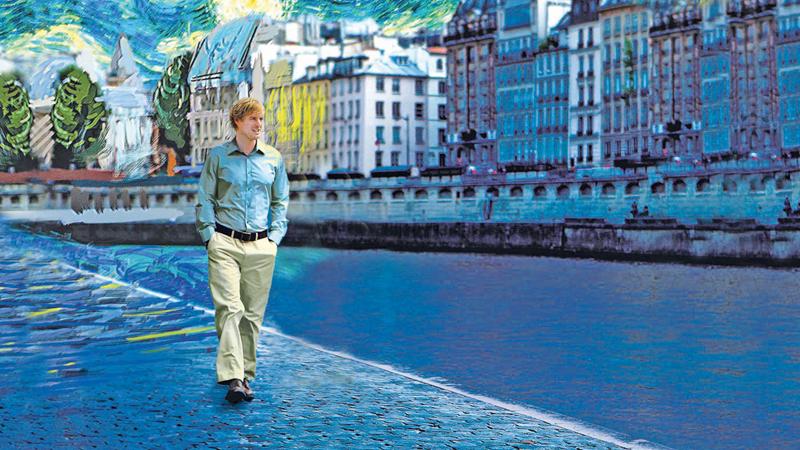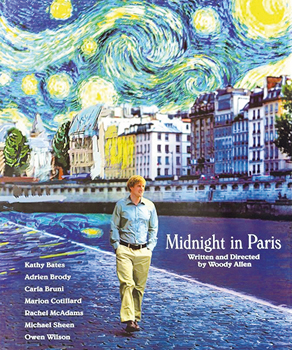
Midnight in Paris is a 2011 fantasy comedy-drama film written and directed by Woody Allen. Set in Paris, the film follows Gil Pender, a screenwriter, who is forced to confront the shortcomings of his relationship with his materialistic fiancée and their divergent goals, which become increasingly exaggerated as he travels back in time each night at midnight. The movie explores themes of nostalgia and modernism.
Produced by the Spanish group Mediapro and Allen’s US-based Gravier Productions, the film stars Owen Wilson, Rachel McAdams, Kathy Bates, Adrien Brody, Carla Bruni, Tom Hiddleston, Marion Cotillard, and Michael Sheen. It premiered at the 2011 Cannes Film Festival and was released in the United States on May 20, 2011. The film opened to critical acclaim and is considered one of Allen’s best films in recent years. In 2012, it won the Academy Award for Best Original Screenplay and the Golden Globe Award for Best Screenplay. It was nominated for three other Academy Awards: Best Picture, Best Director and Best Art Direction.
Critical reception
Midnight in Paris received critical acclaim. On Rotten Tomatoes the film has an approval rating of 93 per cent based on 224 reviews, with an average rating of 7.81/10. The site’s critical consensus reads, “It may not boast the depth of his classic films, but the sweetly sentimental Midnight in Paris is funny and charming enough to satisfy Woody Allen fans.” The film has received Allen’s best reviews and score on the site since 1994’s Bullets Over Broadway. On Metacritic, the film has a score of 81 out of 100, based on 40 reviews, indicating “universal acclaim”.
 The film received some generally positive reviews after its premiere at the 64th Cannes Film Festival. Todd McCarthy from The Hollywood Reporter praised Darius Khondji’s cinematography and claimed the film “has the concision and snappy pace of Allen’s best work”.
The film received some generally positive reviews after its premiere at the 64th Cannes Film Festival. Todd McCarthy from The Hollywood Reporter praised Darius Khondji’s cinematography and claimed the film “has the concision and snappy pace of Allen’s best work”.
A. O. Scott of The New York Times commented on Owen Wilson’s success at playing the Woody Allen persona. He states that the film is marvellously romantic and credibly blends “whimsy and wisdom”. He praised Khondji’s cinematography, the supporting cast and remarked that it is a memorable film and that “ Allen has often said that he does not want or expect his own work to survive, but as modest and light hearted as Midnight in Paris is, it suggests otherwise: Not an ambition toward immortality so much as a willingness to leave something behind—a bit of memorabilia, or art, if you like that word better—that catches the attention and solicits the admiration of lonely wanderers in some future time.”
Roger Ebert gave the film 3 1⁄2 stars out of 4. He ended his review thus:
“This is Woody Allen’s 41st film. He writes his films himself, and directs them with wit and grace. I consider him a treasure of the cinema. Some people take him for granted, although Midnight in Paris reportedly charmed even the jaded veterans of the Cannes press screenings. There is nothing to dislike about it. Either you connect with it or not. I’m wearying of movies that are for “everybody” — which means, nobody in particular. Midnight in Paris is for me, in particular, and that’s just fine with moi.”
Richard Roeper, an American film critic, gave Midnight in Paris an ‘A’ referring to it as a “wonderful film” and “one of the best romantic comedies in recent years”. He commented that the actors are uniformly brilliant and praised the film’s use of witty one-liners.
In The Huffington Post, Rob Kirkpatrick said the film represented a return to form for the director (“it’s as if Woody has rediscovered Woody”) and called Midnight in Paris “a surprising film that casts a spell over us and reminds us of the magical properties of cinema, and especially of Woody Allen’s cinema.”
Midnight in Paris has been compared to Allen’s The Purple Rose of Cairo (1985), in that the functioning of the magical realism therein is never explained. David Edelstein, New York, commended that approach, stating that it eliminates, “the sci-fi wheels and pulleys that tend to suck up so much screen time in time-travel movies.” He goes on to applaud the film stating that, “this supernatural comedy isn’t just Allen’s best film in more than a decade; it’s the only one that manages to rise above its tidy parable structure and be easy, graceful, and glancingly funny, as if buoyed by its befuddled hero’s enchantment.”
Peter Johnson of PopCitizen felt that the film’s nature as a ‘period piece’was far superior to its comedic components, which he referred to as lacking. “While the period settings of Midnight in Paris are almost worth seeing the film ... it hardly qualifies as a moral compass to those lost in a nostalgic revelry,” he asserts.
Joe Morgenstern of The Wall Street Journal acknowledged the cast and the look of the film and, despite some familiarities with the film’s conflict, praised Allen’s work on the film. He wrote, “For the filmmaker who brought these intertwined universes into being, the film represents new energy in a remarkable career.”.
Peter Bradshaw of The Guardian, giving the film 3 out of 5 stars, described it as “an amiable amuse-bouche” and “sporadically entertaining, light, shallow, self-plagiarising.” He goes on to add that it’s “a romantic fantasy adventure to be compared with the vastly superior ideas of his comparative youth, such as the 1985 movie The Purple Rose of Cairo.” In October 2013, the film was voted by the Guardian readers as the ninth best film directed by Woody Allen.
More scathing is Richard Corliss of Time, who describes the film as “pure Woody Allen. Which is not to say great or even good Woody, but a distillation of the filmmaker’s passions and crotchets, and of his tendency to pass draconian judgment on characters the audience is not supposed to like. ... his Midnight strikes not sublime chimes but the clangour of snap judgments and frayed fantasy.”
Quentin Tarantino named Midnight in Paris as his favourite film of 2011.
The film was well received in France. The website Allocine (Hello Cinema) gave it 4.2 out of 5 stars based on a sample of twenty reviews. Ten of the reviews gave it a full five stars, including Le Figaro, which praised the film’s evocation of its themes and said “one leaves the screening with a smile on one’s lips”.
